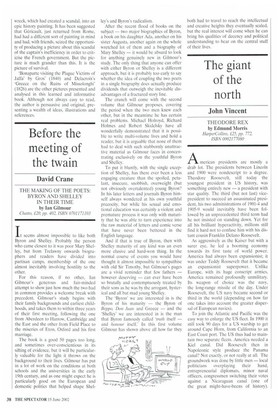Before the meeting of the twain
David Crane
THE MAKING OF THE POETS: BYRON AND SHELLEY IN THEIR TIME by Ian Gilmour Chatto, £20, pp. 402, ISBN 0701171103 It seems almost impossible to like both Byron and Shelley. Probably the person who came closest to it was poor Mary Shelley, but from Trelawny onwards biographers and readers have divided into partisan camps, membership of the one almost inevitably involving hostility to the other.
For this reason, if no other, Ian Gilmour's generous and fair-minded attempt to show just how much the two had in common provides a welcome break with precedent. Gilmour's study begins with their family backgrounds and earliest childhoods, and takes them to within three years of their first meeting, following the one from Aberdeen to Harrow, Cambridge and the East and the other from Field Place to the miseries of Eton, Oxford and his first marriage.
The book is a good 50 pages too long, and sometimes over-conscientious in its sifting of evidence, but it will be particularly valuable for the light it throws on the background to their lives. Gilmour has put in a lot of work on the conditions at both schools and the universities in the early 19th century, and as one might expect he is particularly good on the European and domestic politics that helped shape Shel
ley's and Byron's radicalism.
After the recent flood of books on the subject — two major biographies of Byron, a book on his daughter Ada, another on his sister Augusta, another again on the whole wretched lot of them and a biography of Mary Shelley — it would be absurd to look for anything genuinely new in Gilmour's study. The only thing that anyone can offer with either Byron or Shelley is a different approach, but it is probably too early to say whether the idea of coupling the two poets in a single biography does actually produce dividends that outweigh the inevitable disadvantages of a fractured story line.
The crunch will come with the second volume that Gilmour proposes, covering the period when the two men knew each other, but in the meantime he has certain real problems. Michael Holroyd, Richard Holmes and Robert Skidelsky have all wonderfully demonstrated that it is possible to write multi-volume lives and hold a reader, but it is arguable that none of them had to deal with such stubbornly unattractive material as Gilmour faces in concentrating exclusively on the youthful Byron and Shelley.
To put it bluntly, with the single exception of Shelley, has there ever been a less engaging creature than the spoiled, petulant, insecure, snobbish, overweight (but not obviously overtalented) young Byron? In his later letters and journals Byron himself always wondered at his own youthful precocity, but while his sexual and emotional education was certainly a violent and premature process it was only with maturity that he was able to turn experience into the raw material of letters and comic verse that have never been bettered in the English language.
And if that is true of Byron, then with Shelley maturity of any kind was an even more elusive and hard-won thing. In the normal course of events you would have thought it almost impossible to sympathise with old Sir Timothy, but Gilmour's pages are a vivid reminder that few fathers — however deserving — can ever have been so brutally and contemptuously treated by their sons as he was by the arrogant, hysterical and all but mad young Shelley.
The 'Byron' we are interested in is the Byron of his maturity — the Byron of Beppo, Don Juan and Greece — and the 'Shelley' we are interested in is the man that Byron famously called 'truth itself — and honour itself.' In this first volume Gilmour has shown above all how far they
both had to travel to reach the intellectual and creative heights they eventually scaled, but the real interest will come when he can bring his qualities of decency and political understanding to bear on the central stuff of their lives.


































































 Previous page
Previous page